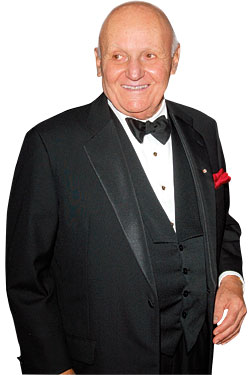
Shuffle those cards,” says Alan “Ace” Greenberg. The legendary 82-year-old Bear Stearns chairman is sitting in his corner office on Park Avenue at a table covered with the tools of a hobby magician, which he is. “I want you to take a card and slide it over there without looking at it,” he says, “and when my head is turned, I want you to look at it. Don’t let me see it!” He shuffles the cards. “Now I’m going to run my finger down the deck, and you say ‘Stop’ when you want me to stop, okay?” Stop! Greenberg splits the deck open to reveal a five of hearts, the card I’d picked. “It’s a miracle!” he shouts, resting his hands contentedly on his belly.
A perfectly executed card trick pleases Ace Greenberg. But mention House of Cards, the history of the collapse of Bear Stearns written by Lazard banker turned journalist William Cohan, and his expression darkens. “House of Cards was such lies,” he says. The book so irked Greenberg, who is known for using his vast wealth for quirky projects (famously donating $1 million to provide Viagra to men who couldn’t afford it), that he commissioned New Yorker staffer Mark Singer to help him write what is basically a rebuttal: The Rise and Fall of Bear Stearns.
“The reason I wrote the book is that 25 or 30 years from now, my grandchildren or great-grandchildren are going to wonder about me and, honest to God, Jessica”—Greenberg employs the Dale Carnegie trick of frequently addressing people by name—“I don’t want them to judge me based on that ridiculous House of Cards book.”
Written with the cooperation of Jimmy Cayne, the firm’s CEO and Greenberg’s onetime close friend and bridge partner, House of Cards credits Cayne rather than Greenberg as the figure who “built Bear Stearns from the ground up” and gives Cayne a platform for his pet theory about the company’s collapse, which is that the firm was undone not by its own hand but by a vicious cabal of rumormongers. Greenberg scoffs at this. “The facts were very simple,” he says. “We were highly leveraged and the things we owned we thought were worth 100 and they were worth 40 or 50. When you’re highly leveraged, Jessica, and things go from 100 to 40, you don’t do well. Did the rumors cause it to go down sooner? It doesn’t matter!”
In 1993, Greenberg ceded the CEO position to Cayne after either an epic power struggle in which Greenberg threw a “tantrum” (according to Cayne) or a brief, civil conversation (according to Greenberg). “Tantrum?” he says in his book. “The whole notion is so alien to my style and temperament.” As CEO, Greenberg ran a tight but simple ship. When the company went public in 1985, and the firm’s total capital went from $46 million to $517 million, he curtailed orders for rubber bands and paper clips as a cost-cutting measure. “I am fully aware of the amount of money we saved every year on not buying paper clips and rubber bands was probably $10,” he says. “But what I was trying to do was to set a mood of watching expenses. Hand me those rubber bands,” he says, and snaps one until it breaks. “I take the broken rubber band, and I tie a knot in it. You can still do things with this.” He stretches out the rubber band and—presto!—the knot is gone and the rubber band is whole again. It’s a miracle!
Once, to combat what he saw as the problem of employees’ leaving the office early, Greenberg sent out a memo threatening to fit suspected slackers with radio collars from the St. Louis Zoo. In his opinion, Cayne was too often found at golf and bridge tournaments during pivotal moments of the Bear Stearns collapse. “He was supposed to be the captain of our ship,” Greenberg says. “Now, at that time, we needed Captain Sully. And we did not have him. We had somebody who wasn’t here very much.”
According to House of Cards, “there wasn’t a dry eye” in the house when Cayne resigned in January 2008. “Figuratively,” Greenberg cracks in his book, “some people might have felt the urge to shed tears of joy.”
“I’m not saying I’m perfect,” says Greenberg. “Maybe I made some mistakes with Jimmy. Maybe I could have done more things to save our relationship. But life is a series of chapters, and who knows? Maybe down the line we’ll get back together.”
As for House of Cards author William Cohan, he says, “we have a luncheon date in June. I said, ‘When you read my book, you’re going to realize what terrible lies you were fed, ha ha ha ha.’ ” He beams. “I won’t show him any magic tricks, though. That will be his punishment. No magic tricks for you!”
Have good intel? Send tips to intel@nymag.com.